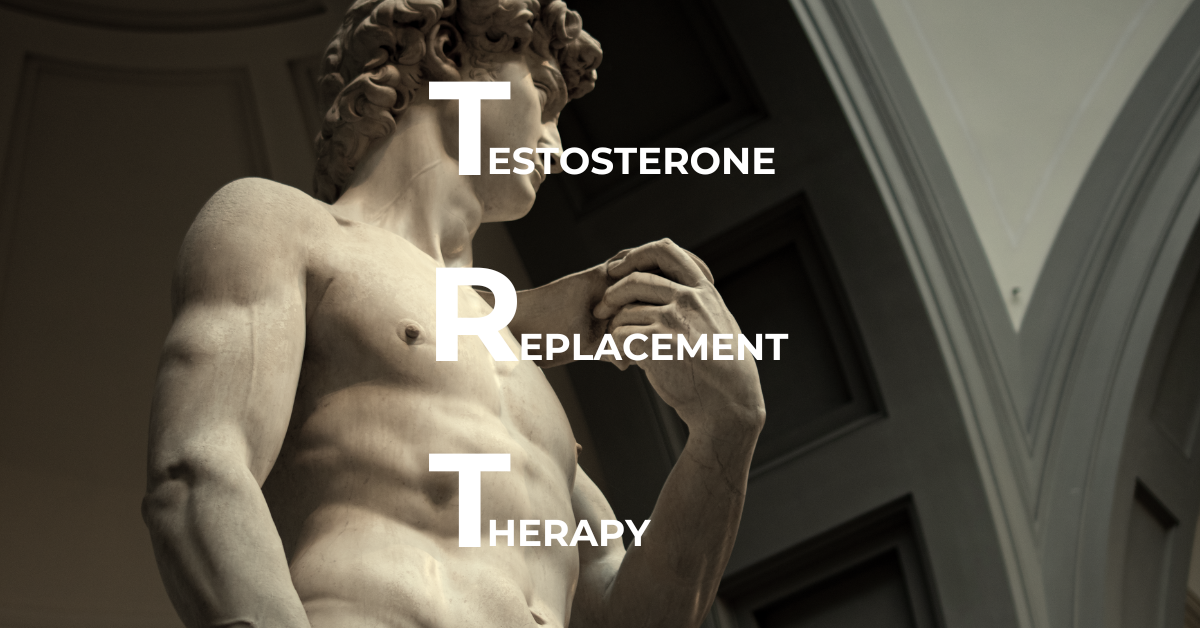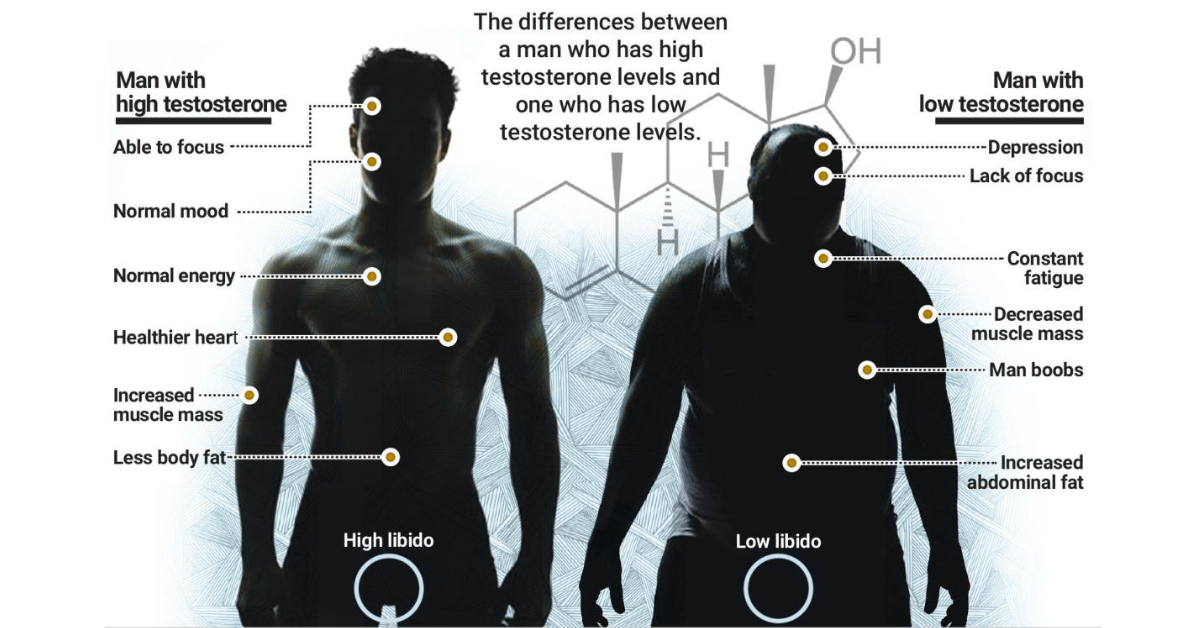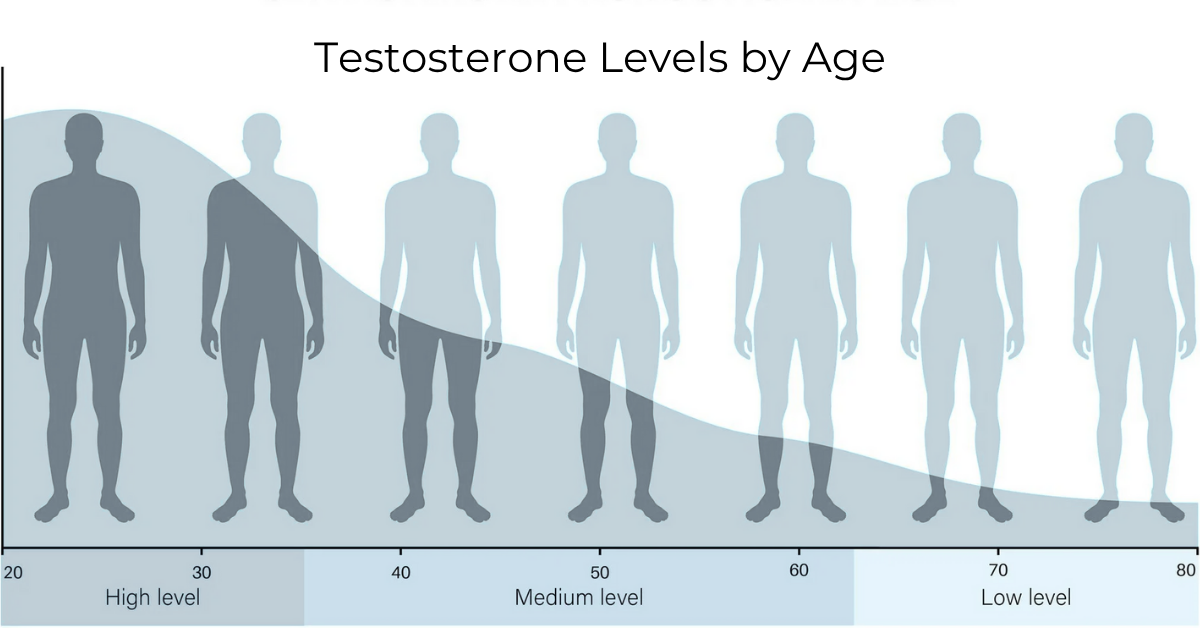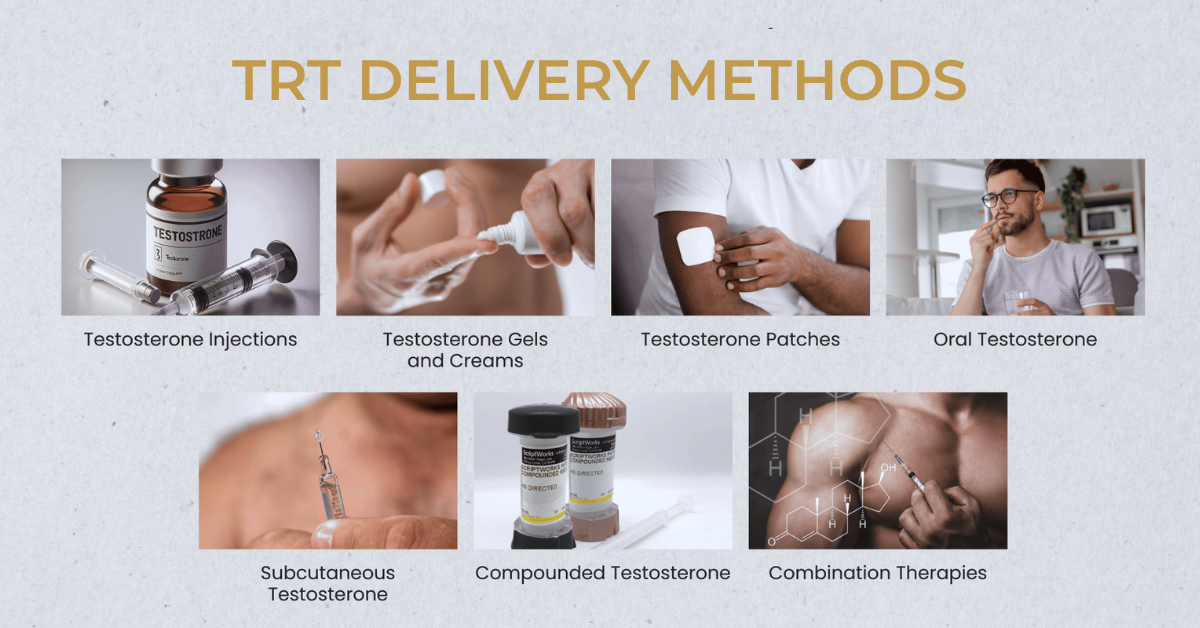The HIGH cost of LOW T

Feeling Drained, Moody, or Just Not Yourself? Let's Talk Testosterone.
Energy crash by 2 PM, motivation in the gutter, libido that's gone AWOL—low testosterone snowballs fast. You know that feeling when you used to crush workouts but now struggle to get off the couch? When your brain feels like it's running on dial-up internet while everyone else has fiber optic? Or when your partner asks if you're okay for the third time this week because you've been snapping at everything? Here's the plot twist: your fourth cup of coffee isn't fixing what's broken—it's masking it.
Recent research suggests that testosterone levels in men have been steadily declining for decades, with the average man today having significantly lower levels than men in the 1980s (Journal of Clinical Endocrinology & Metabolism, 2024). That's millions of guys walking around feeling like shadows of themselves, and most don't even know why. The kicker? Standard lab work often gives you the "you're fine" shrug while you're quietly falling apart.
Low testosterone isn't just about sex drive—that's the final act of a much longer drama. Long before your libido waves the white flag, your body has been quietly rationing testosterone like it's wartime. Your energy tanks, your mood goes sideways, your muscle mass starts disappearing, and your brain gets foggy. Sound familiar?
Testosterone 101 – The CEO of Your Hormones
Think of testosterone as the CEO of your endocrine system—when it's not showing up to work, the whole operation falls apart. Testosterone isn't just about muscles and bedroom performance; it's the executive hormone that oversees everything from energy production to mood regulation to bone density.
But testosterone's job description goes way beyond what most guys think:
- Energy and metabolism: Testosterone is crucial for maintaining lean muscle mass and healthy fat distribution. When levels drop, your metabolism slows down, making it easier to gain weight and harder to lose it. You start feeling like your internal engine is running on fumes even when you're getting enough sleep.
- Brain function and mood regulation: Your brain has testosterone receptors throughout, especially in areas that control mood, motivation, and cognitive function. Low testosterone doesn't just make you tired; it can trigger depression, anxiety, and that frustrating brain fog that makes you feel like you're thinking through molasses.
- Bone health and muscle maintenance: Testosterone helps maintain bone density and muscle mass. When it's low, you're not just losing strength—you're increasing your risk of fractures and accelerating the aging process.
Here's the kicker: your body treats testosterone like a luxury item. When you're stressed, sleep-deprived, or dealing with chronic health issues, testosterone production gets deprioritized. It's like your body is saying, "We're in survival mode—reproduction and vitality can wait."

Warning Signs Before Full-Blown Hypogonadism
Sneaky Early Symptoms
Low testosterone is the master of disguise—it masquerades as everything from work stress to midlife crisis to just "getting older." The symptoms creep up so gradually that most men adapt to feeling subpar, chalking it up to busy lifestyles or accepting decline as inevitable. But your body is actually sending you distress signals long before your provider runs a hormone panel.
- The fatigue that rest can't fix: We're not talking about being tired after a long day. This is the bone-deep exhaustion that persists even after a full night's sleep. You wake up feeling like you never went to bed, and by afternoon, you're fantasizing about a nap under your desk. Research from Cedars-Sinai shows that testosterone deficiency can cause crushing fatigue that doesn't respond to typical rest and recovery (Cedars-Sinai, 2024).
- Mood swings that make you question your sanity: Irritability, depression, and anxiety aren't just signs of stress. Low testosterone directly impacts neurotransmitter production and mood regulation. Studies have shown that men with low testosterone are significantly more likely to experience depression and anxiety disorders (Centre for Men's Health, 2024).
- The vanishing libido: This one gets all the attention, but it's often a late-stage symptom. By the time your sex drive has completely tanked, you've probably been dealing with other symptoms for months or years. Loss of morning erections is often an earlier and more reliable indicator than decreased interest in sex.
- Muscle loss and stubborn fat gain: If you're eating the same and exercising the same but somehow getting softer around the middle while your arms and shoulders seem to be shrinking, low testosterone might be the culprit. Testosterone is crucial for maintaining lean muscle mass and healthy fat distribution.
- Brain fog and memory issues: Trouble concentrating, forgetting names, and that feeling like your mental sharpness has dulled aren't just signs of aging. Testosterone plays a crucial role in cognitive function, and deficiency can significantly impact memory and focus (Healthline, 2024).
Labs Lie (Sometimes)
Here's the frustrating truth: standard testosterone panels often miss deficiency, especially in its early stages. Most providers order a basic total testosterone test, usually in the afternoon when levels are naturally lower, and call it good. But testosterone levels fluctuate wildly throughout the day, and total testosterone doesn't tell the whole story.
The problem is that total testosterone—the amount of testosterone floating around in your blood—includes both bound and free testosterone. But only free testosterone is biologically active. It's like measuring all the money in your bank account without distinguishing between what's available to spend and what's tied up in long-term investments.
Free testosterone is the real MVP: Free testosterone is the hormone that's actually available to your tissues, and it's a much more reliable indicator of how you'll feel and function. While conventional medicine considers total testosterone levels above 300 ng/dL "normal," functional medicine providers know that optimal function requires much higher levels, and free testosterone is often more important than total.
The timing factor: Testosterone levels are highest in the morning and decline throughout the day. Testing in the afternoon can give falsely low readings, while testing first thing in the morning provides a more accurate picture of your peak production.
.png)
Why So Many Men Are Running Low
The Modern Masculinity Crisis
Let's be real: being a modern man is basically a testosterone-depleting obstacle course. Between chronic stress, environmental toxins, poor sleep, and sedentary lifestyles, it's a miracle any of us have normal levels. Research shows that average testosterone levels have been declining for decades, and it's not just about aging (BMJ Best Practice, 2024).
Stress is testosterone's kryptonite: Chronic stress elevates cortisol, which directly suppresses testosterone production. When you're constantly in fight-or-flight mode—whether from work pressure, financial stress, or relationship issues—your body prioritizes survival over reproduction and vitality.
Sleep deprivation compounds the problem: Most testosterone production happens during deep sleep. When you're chronically sleep-deprived, you're literally not giving your body the time it needs to produce adequate testosterone. Studies show that men who sleep less than 5 hours per night have significantly lower testosterone levels than those who get 7-8 hours.
Environmental toxins are everywhere: Endocrine disruptors in plastics, pesticides, and personal care products can interfere with hormone production. These chemicals mimic or block hormones, creating chaos in your endocrine system.
The inflammation connection: Just like with iron, chronic inflammation can affect testosterone production and binding proteins. Stress, poor sleep, and underlying health conditions can all suppress testosterone production, creating a vicious cycle where low testosterone makes you feel worse, which creates more stress, which further suppresses testosterone.
Obesity creates a vicious cycle: Fat tissue converts testosterone to estrogen, and higher estrogen levels signal the body to produce less testosterone. The more weight you gain, the lower your testosterone gets, making it even harder to lose weight and build muscle.
Alcohol and poor diet: Regular alcohol consumption, especially binge drinking, can suppress testosterone production. Diets high in processed foods and low in healthy fats also negatively impact hormone production.
Lack of resistance training: Your muscles and testosterone production have a symbiotic relationship. Regular strength training stimulates testosterone production, while sedentary lifestyles contribute to decline.

Age: The Inevitable Decline
Starting around age 30, men naturally lose about 1% of their testosterone production per year. By age 50, many men have levels that are 30-50% lower than their peak. But here's the thing: this "natural" decline doesn't mean you have to accept feeling like garbage.
It's not just about the number: Some men feel great with testosterone levels that would leave others feeling terrible. Symptoms matter more than arbitrary lab ranges, and optimal function often requires levels in the upper half of the "normal" range.

Myth Busting: The Truth About TRT
Let's address the elephant in the room. When most guys hear "testosterone therapy," their minds immediately go to images of roid-raging bodybuilders or guys who suddenly turn into aggressive jerks. These myths aren't just wrong—they're keeping men from getting help they actually need.
Myth: "TRT will turn you into a steroid monster"
- Reality: TRT is about bringing your levels back to normal, not turning you into the Hulk. We're talking about restoring what your body used to produce naturally, not superhuman doses.
Myth: "You'll become angry and aggressive"
- Reality: Low testosterone is actually more likely to make you irritable and moody. When done correctly, TRT typically improves mood stability—not the other way around. The "roid rage" stereotype comes from people abusing massive doses, which is completely different from medically supervised replacement.
Myth: "It's just for bodybuilders"
- Reality: The average TRT patient is a regular guy who wants to feel energetic enough to play with his kids and focused enough to excel at work. TRT patients include executives, teachers, and guys from every walk of life who just want to feel like themselves again.
Myth: "It's not natural"
- Reality: Having testosterone levels of a 90-year-old when you're 45 isn't "natural" either. Environmental toxins and modern lifestyle factors have created an epidemic of low testosterone. Using bioidentical testosterone to restore normal function is helping your body do what it's supposed to do.
The Smart Provider Approach (Test > Identify > Fix)
The best providers don't just run a single testosterone test and call it a day. Forward-thinking practices—like Prosper Health, for instance—take a comprehensive approach that looks at the whole hormonal picture, not just one number on a lab report.
- Comprehensive hormone assessment: Smart providers test total testosterone, free testosterone, SHBG (sex hormone-binding globulin), estradiol, LH, FSH, and other relevant markers. They also test at the right time of day—typically first thing in the morning when levels are highest—and often repeat testing to confirm results.
- Root cause investigation: Finding low testosterone is just the beginning. The best providers dig deeper to understand why your levels are low. Is it primary hypogonadism (testicular dysfunction) or secondary hypogonadism (pituitary/hypothalamic dysfunction)? Are lifestyle factors contributing? Are there underlying health conditions that need to be addressed?
- Personalized treatment strategies: Not everyone with low testosterone needs the same approach. Some men benefit from lifestyle modifications alone—optimizing sleep, managing stress, losing weight, and increasing physical activity. Others need testosterone replacement therapy (TRT) to restore optimal function. Good providers tailor the approach based on your symptoms, lab values, health history, and personal goals.
- Ongoing monitoring and optimization: Testosterone replacement isn't a set-it-and-forget-it treatment. Responsible providers monitor your response to treatment, adjust dosing as needed, and watch for potential side effects like elevated red blood cell count or changes in prostate markers.
TRT: When Lifestyle Isn't Enough
For men with clinically low testosterone who haven't responded to lifestyle modifications, testosterone replacement therapy can be life-changing. But let's be clear: TRT isn't a magic bullet, and it's not right for everyone.
TRT delivery methods: Testosterone can be delivered through injections, gels, patches, or pellets. Each method has pros and cons in terms of convenience, cost, and how well it maintains stable levels. Injections are often preferred because they're cost-effective and allow for precise dosing.
The fertility factor: One of the biggest concerns about TRT is its impact on fertility. Testosterone replacement can suppress natural production and reduce sperm count. For men who want to maintain fertility, providers may recommend hCG (human chorionic gonadotropin) alongside TRT to preserve testicular function.
Monitoring for safety: Responsible TRT requires regular monitoring of testosterone levels, red blood cell count, prostate markers (PSA), and other health indicators. Recent research from Cedars-Sinai shows that properly monitored TRT is safe for heart health in men aged 45-80, contradicting earlier concerns about cardiovascular risks (Cedars-Sinai, 2024).

Testosterone Optimization Cheat-Sheet
Ready to start optimizing your testosterone naturally? Here are the strategies that can make a real difference:
- Prioritize sleep quality: Aim for 7-8 hours of quality sleep per night. Most testosterone production happens during deep sleep, so this isn't negotiable. Create a sleep-friendly environment, limit screen time before bed, and consider addressing sleep disorders like sleep apnea.
- Lift heavy things: Resistance training, especially compound movements like squats, deadlifts, and presses, stimulates testosterone production. High-intensity interval training (HIIT) can also be beneficial, but avoid excessive endurance training, which can suppress testosterone.
- Manage stress effectively: Chronic stress is testosterone's enemy. Find stress management techniques that work for you—whether it's meditation, yoga, time in nature, or regular massage. The goal is to break the cycle of chronic cortisol elevation.
- Optimize your diet: Focus on healthy fats (olive oil, avocados, nuts), adequate protein, and plenty of vegetables. Limit processed foods, excessive alcohol, and sugar. Some studies suggest that vitamin D, zinc, and magnesium supplementation can support healthy testosterone levels.
- Maintain a healthy weight: Obesity and low testosterone create a vicious cycle. Even modest weight loss can significantly improve testosterone levels in overweight men.
Bottom Line
Low testosterone is the great masquerader of men's health—hiding behind fatigue, mood issues, and declining performance while standard lab work gives you the all-clear. But here's the thing: you don't have to accept feeling like a shell of your former self as your new normal. With the right testing, root-cause investigation, and personalized treatment approach, you can reclaim your energy, sharpen your focus, and feel like the man you know you are again.
The key is working with providers who understand that "normal" lab values don't always equal optimal function, and who are willing to dig deeper to find the real story behind your symptoms.
Live long. Join Prosper Health.
.png)
Sources
BMJ Best Practice. (2024). "Hypogonadism in men - Symptoms, diagnosis and treatment." BMJ Best Practice. https://bestpractice.bmj.com/topics/en-us/1093
Cedars-Sinai. (2024 ). "Research Finds Testosterone Therapy Safe for Heart Health." Cedars-Sinai Blog. https://www.cedars-sinai.org/blog/research-finds-testosterone-therapy-safe-for-heart-health.html
Centre for Men's Health. (2024 ). "17 signs and symptoms of low testosterone." Centre for Men's Health. https://www.centreformenshealth.co.uk/articles/17-signs-and-symptoms-of-low-t
Cleveland Clinic. (2025 ). "Testosterone Replacement Therapy (TRT): What It Is." Cleveland Clinic. https://my.clevelandclinic.org/health/treatments/testosterone-replacement-therapy-trt
Healthline. (2024 ). "Signs and Symptoms of Low Testosterone." Healthline. https://www.healthline.com/health/low-testosterone/warning-signs
Journal of Clinical Endocrinology & Metabolism. (2024 ). Referenced for testosterone decline data. PMC. https://pmc.ncbi.nlm.nih.gov/articles/PMC4772354/
Mayo Clinic Proceedings. (2024 ). "Androgen Society Position Paper on Cardiovascular Risk With Testosterone Therapy." Mayo Clinic Proceedings. https://www.mayoclinicproceedings.org/article/S0025-6196(24 )00408-7/fulltext
Progyny. (2024). "Testosterone Deficiency 101." Progyny Education. https://progyny.com/education/male-infertility/testosterone-deficiency-101/
University of Alabama at Birmingham. (2024 ). "Understanding the signs, causes and treatment options for low testosterone." UAB News. https://www.uab.edu/news/health-medicine/understanding-the-signs-causes-and-treatment-options-for-low-testosterone

.svg)

.svg)
.svg)
.svg)